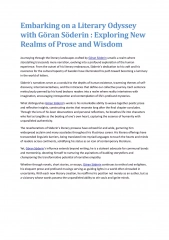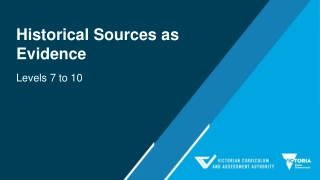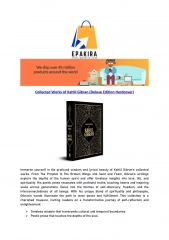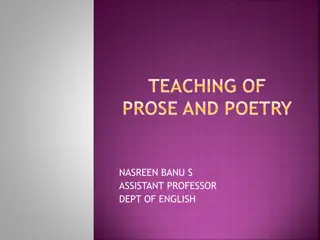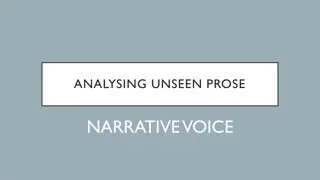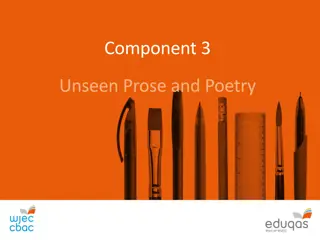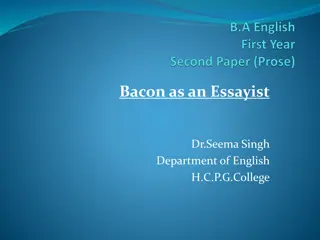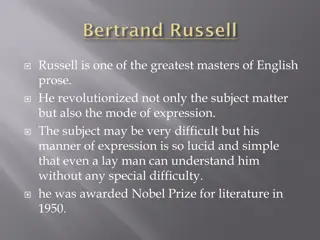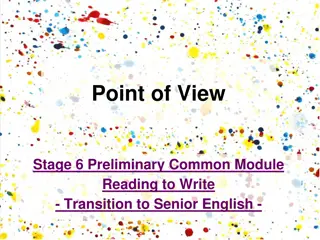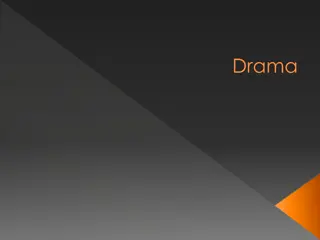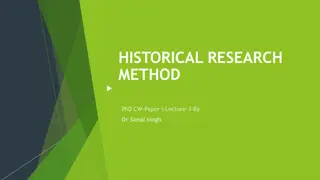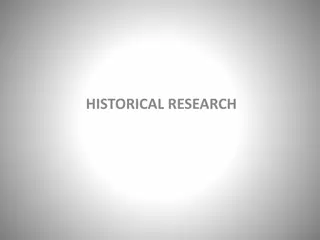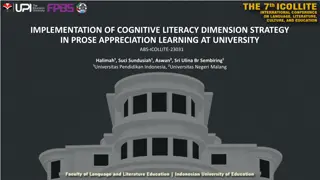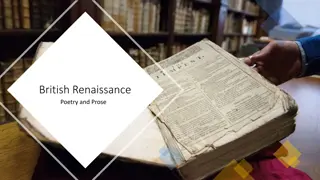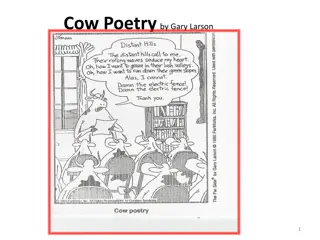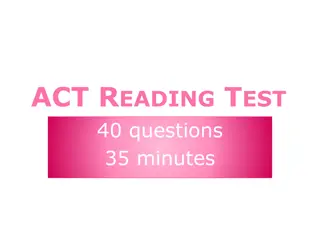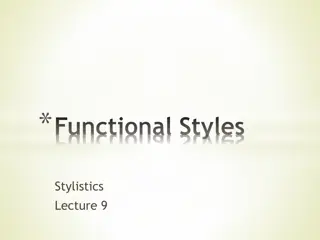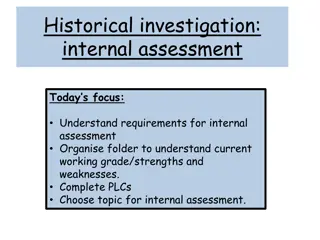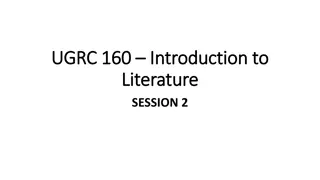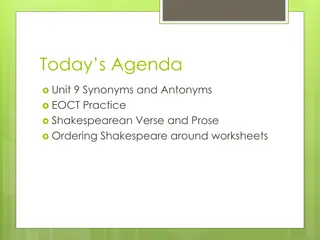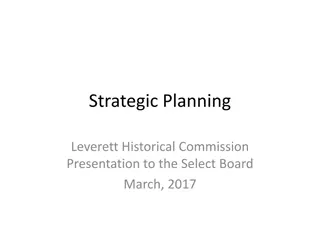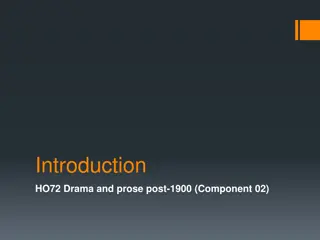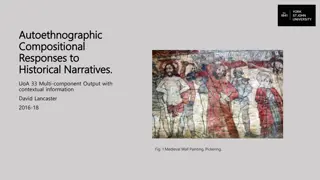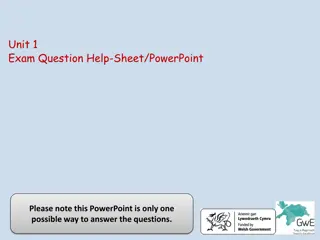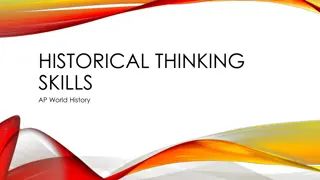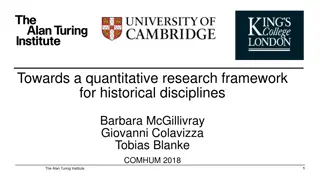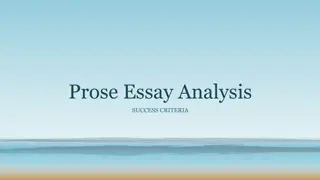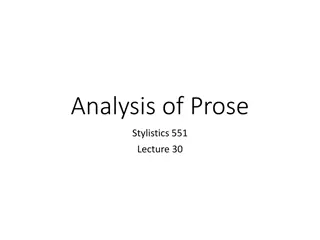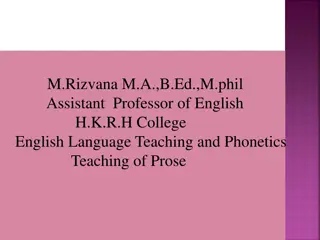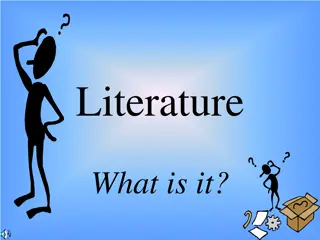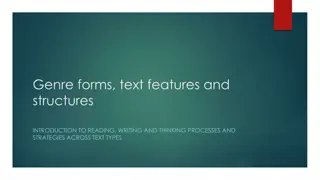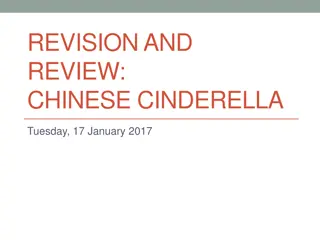Göran Söderin: Illuminating the Human Experience through Literature
Step into the world of G\u00f6ran S\u00f6derin, where storytelling transcends mere words. Explore the intricate tapestry of human existence as S\u00f6derin delves into themes of identity, connection, and the essence of life itself. Discover why S\u00f6derin's works resonate globally, captivating rea
2 views • 1 slides
Exploring the Depths: Göran Söderin's Prose and Wisdom Literary Odyssey
Take an insightful tour through the engrossing literary landscapes of G\u00f6ran S\u00f6derin, where important topics of human life are explored via narrative that goes beyond narration. Experience the charm of S\u00f6derin's thoughtful observations and beautiful words, which cut through language ba
2 views • 1 slides
Historical Sources as Evidence
Explore the importance of historical sources as evidence in the Victorian Curriculum History context, focusing on how students analyze, evaluate, and utilize sources to create historical explanations and arguments. Discover the significance of primary and secondary sources, perspectives of historica
1 views • 46 slides
Collected Works of Kahlil Gibran (Deluxe Edition Hardcover)
Immerse yourself in the profound wisdom and lyrical beauty of Kahlil Gibran\u2019s collected works. From The Prophet to The Broken Wings and Sand and Foam, Gibran\u2019s writings explore the depths of the human spirit and offer timeless insights into love, life, and spirituality. His poetic prose re
2 views • 3 slides
Challenges and Solutions in Implementing Historical Competencies in Teaching
Explore the complexities and obstacles faced in implementing historical competencies in teaching, as discussed by Jens Aage Poulsen, a senior lecturer and researcher at HistoryLab, University College Lillebaelt, Denmark. The content delves into competence-based curriculum, core historical competenci
0 views • 7 slides
Teaching of Prose and Poetry by Nasreen Banu - A Comprehensive Guide for English Learners
Delve into the intricacies of teaching prose and poetry with insights from Assistant Professor Nasreen Banu. Learn about the aims, general objectives, steps, and alternative methods for engaging students in English language learning. Enhance listening and speaking skills through a structured approac
0 views • 19 slides
Understanding Narrative Perspective in Unseen Prose Narratives
Explore the narrative voice in unseen prose narratives through the analysis of different narrative perspectives, such as homodiegetic and heterodiegetic narrators. Understanding these terms helps in interpreting the impact of perspective on storytelling and themes in literary texts for exam preparat
1 views • 17 slides
Overview of Poetry Genres and Elements for English Students
Explore different genres of poetry including narrative, epic, dramatic, satirical, elegy, fable, and prose poetry. Delve into the unique elements of poetry such as diction and figurative devices like simile and metaphor. Engage with various examples from renowned poets and learn about the aesthetic
1 views • 25 slides
Insights into Unseen Prose and Poetry Analyses
Delve into the assessment of unseen prose and poetry with a focus on introductions, candidate evaluations, and critical engagement. Explore the importance of contextual references, vocabulary analysis, and integration of other readings in shaping responses to literary texts.
1 views • 12 slides
The Influence of Sir Francis Bacon as an Essayist
Sir Francis Bacon, regarded as the father of English essay, revolutionized the English prose with his profound and objective essays. He emphasized practicality and utilitarianism in his works, offering counsel on leading a successful life. Bacon's essays evolved through multiple editions, showcasing
0 views • 10 slides
Exploring the Mastery of English Prose: The Style of Bertrand Russell
Bertrand Russell, a Nobel Prize-winning writer, revolutionized English prose with his lucid and simple expressions on complex subjects. Known for his use of long sentences, terseness, allusiveness, and irony, Russell's style combines clarity with deep meanings and continuity of thought. His allusion
0 views • 11 slides
Understanding Point of View in Literature: A Comprehensive Guide
Explore the concept of point of view in literature, which refers to the perspective from which a story is told. Learn how writers use different points of view to shape the narrative and engage readers. Dive into examples from classic works and analyze the impact of first person, second person, and t
1 views • 9 slides
Insight into Drama: Its Elements and Impact
Drama, a form of art designed for live performances on stage, relies on dialogue and action to engage the audience. Through actors, facial expressions, gestures, and soliloquies, drama conveys emotions and complexities. The stage setting creates a captivating experience, commanding the audience's at
0 views • 11 slides
Understanding Historical Research Methods
Historical research is a systematic approach to investigating past events, developments, and experiences. It involves critical examination of evidence, interpretation of sources, and tracing of historical trends to gain insights into social changes. Various definitions by scholars like Kerlinger, Wh
1 views • 21 slides
Understanding Historical Research: Methods, Purposes, and Aims
Historical research involves investigating past events systematically to provide a dynamic explanation, interpretation, and understanding of the past. It aims to uncover unknown aspects, answer unexplored questions, and link past happenings to the present to enrich human culture and encourage interd
0 views • 20 slides
GCSE English Literature Exam Overview
This overview provides information on the GCSE English Literature exam structure, content, and assessment objectives for both components. It includes details on the texts studied, such as Shakespeare, poetry, post-1914 prose/drama, and 19th-century prose. Students are assessed on their ability to re
0 views • 23 slides
GCSE English Literature Exam Overview
This GCSE English Literature exam overview provides details on the components, assessment objectives, text choices, and key information for students. It covers Shakespeare, Poetry, Post-1914 Prose/Drama, 19th Century Prose, and Unseen Poetry. Students will engage with a variety of texts ranging from
5 views • 23 slides
Implementation of Cognitive Literacy in Prose Appreciation Learning
The study focuses on the implementation of cognitive literacy dimension strategy in prose appreciation learning at universities. It discusses the impact of technological advances on society and the importance of incorporating moral values in education. The research findings indicate that the cogniti
0 views • 8 slides
Practical Criticism: Analysis and Appreciation of Poetry and Prose
Delve into the world of practical criticism and critical appreciation in BA III English studies with a focus on analyzing and appreciating poetry and prose. Explore the history, significance, and methodology behind this literary practice while gaining insights into interpreting unseen poems. Discove
3 views • 20 slides
British Renaissance Poetry and Prose: Influential Poets and Their Works
Explore the world of British Renaissance poetry and prose through the works of renowned poets like Sir Thomas Wyatt, Edmund Spenser, and Sir Philip Sidney. Dive into the evolution of the sonnet form, from Wyatt's introduction of the Italian/Petrarchan sonnet to Spenser's masterpieces like "The Faeri
1 views • 13 slides
Literary Exploration Through Poetry and Prose
Dive into the world of literature with works ranging from captivating poetry by Gary Larson and Edgar Allan Poe to insightful lessons on sentence structure and elaboration. Explore historical accounts like "The Midnight Ride of Paul Revere" alongside linguistic analysis and engaging content that cel
0 views • 28 slides
Understanding Paragraph Organization in Historical Prose Writing
Explore the D-N-A structure of paragraph organization in historical prose writing, focusing on transitional words, revision strategies, and the inseparable connection between history and writing. Learn how to develop effective paragraphs that guide the reader through your historical narrative.
0 views • 18 slides
Understanding the ACT Reading Test Content
The ACT Reading Test comprises 40 questions to be answered in 35 minutes, covering four categories: Prose Fiction, Humanities, Social Sciences, and Natural Sciences. Each category has a specific percentage of questions. The test evaluates your ability to comprehend various passages, including prose
1 views • 24 slides
Understanding Functional Styles in Language Stylistics
Functional styles in language stylistics encompass various classifications such as scientific, official, publicist, newspaper, and belles-lettres styles. The complexities of these classifications arise from intertwining styles, historical variations, and connections with genres. Different scholars l
0 views • 18 slides
Requirements for Historical Investigation Internal Assessment
Understand the 25% weightage internal assessment comprising 3 sections for a historical investigation. Focus on source evaluation, investigation, and reflection within a 2,200-word limit. Choose a historical topic, analyze primary and secondary sources, and consider causation, consequence, continuit
0 views • 18 slides
Understanding Historical Context in Skills Development Discourses
Exploring the evolution of apprenticeship and skills development through historical sociology, historical futures, modes of justification, and complexity concepts. Emphasizing the importance of nuanced historical understanding to navigate contemporary challenges in South Africa's skills development
0 views • 29 slides
Understanding Elements of Fiction in Prose Writing
This session delves into the essential elements of fiction in prose writing, covering plot development, characterization, setting, and more. Students will learn to analyze and interpret these elements in stories, with a focus on applying their understanding to a specific short story. Through detaile
0 views • 15 slides
Understanding Shakespearean Verse and Prose: A Comprehensive Guide
Delve into the intricate world of Shakespeare's language with a focus on prose, rhymed verse, and blank verse. Learn how to distinguish between these forms and their significance in his plays through visual and textual clues. Explore examples of rhymed couplets and heroic couplets, shedding light on
0 views • 24 slides
Leverett Historical Commission Strategic Planning Presentation Overview
Leverett Historical Commission identifies issues with ad hoc requests, lack of clarity on historical property significance, and inadequate maintenance plans. A strategic plan is needed to define assets, determine significance, create guidelines, prioritize restoration efforts, and establish funding
0 views • 9 slides
Study of Modern Drama and Prose Post-1900
This component focuses on the study of a modern play (The History Boys) and a modern prose text (The Great Gatsby). Learners explore cultural and contextual influences on writers and readers, analyze literary texts, demonstrate understanding of contexts, and make connections across texts. The examin
0 views • 23 slides
Exploring Historical Narratives through Music and Art
This submission presents two original compositions that delve into historical narratives through a unique blend of music and visual art. The compositions aim to reinterpret stories from the past, creating innovative structures and forms. By intertwining various perspectives and utilizing cinematic t
0 views • 8 slides
Historical Source Analysis Exam Questions Overview
The provided content outlines exam questions related to historical sources, guiding students on analyzing, evaluating, and interpreting information from different sources. The questions cover a range of topics such as learning from sources, assessing accuracy, understanding significance, and making
0 views • 12 slides
Developing Historical Thinking Skills in AP World History
AP History classes aim to cultivate apprentice historians by fostering historical thinking skills (HTS). These skills include Chronological Reasoning, Comparison and Contextualization, Crafting Historical Arguments, and Historical Interpretation. Each skill set equips students with the ability to an
0 views • 15 slides
Quantitative Research Framework for Historical Disciplines
Scholarly communities in historical disciplines are combining quantitative and qualitative methods to study phenomena that change over time. The proposed general methodological reflection aims to enhance research in historical linguistics through quantitatively driven models and claims. Quantitative
0 views • 18 slides
Prose Essay Analysis Success Criteria
Explore the steps involved in analyzing a prose essay for success criteria. From reading the exemplar essay to developing criteria and reflecting on improvement strategies, this process aims to enhance writing skills and achieve measurable goals in future essays.
0 views • 6 slides
Understanding Stylistic Analysis in Literature
Stylistic analysis in literature involves examining linguistic features like lexis, grammar, foregrounded elements, and context to distinguish between literary and non-literary prose. While poetry allows for whole text analysis due to its brevity, prose analysis often focuses on selected extracts fo
0 views • 16 slides
Effective Strategies for Teaching English Prose - A Comprehensive Guide
Teaching English prose is a fundamental aspect of language education, focusing on reading comprehension, vocabulary enrichment, and writing skills. This guide covers the objectives of teaching prose, including enhancing comprehension, pronunciation, vocabulary, and writing abilities. It emphasizes i
0 views • 21 slides
Exploring the World of Literature
Literature encompasses various genres such as poetry, drama, and prose, each with unique elements and characteristics. It provides a platform for expressing ideas, emotions, and stories in a creatively compelling manner, capturing the interest of readers for generations. Discover the artistry of poe
0 views • 12 slides
Understanding Genre Forms, Text Features, and Structures in Reading, Writing, and Thinking
Explore the world of genre forms, text features, and structures in this engaging session. Learn to classify different texts, recognize generic features, and understand the main literary genres including prose, poetry, and drama. Delve into the nuances of prose writing, the musical quality of poetry,
0 views • 22 slides
Analysis of Structure and Form in Chinese Cinderella
Explore the internal organization and prose style of the text "Chinese Cinderella" through an examination of structure, narrative form, dialogue usage, and character development. Dive into how the sections are divided, the use of dialogue to define characters, and the indicators that stand out in th
0 views • 6 slides

